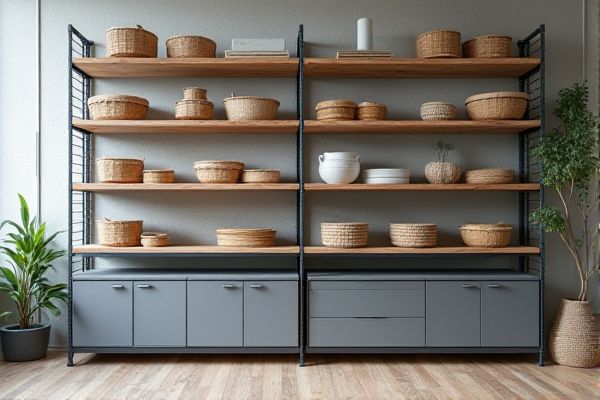
Heavy-duty shelves provide superior strength and durability for storing bulky or heavy items, while wire shelves offer better ventilation and visibility, making them ideal for lighter or moisture-sensitive goods. Discover which type of shelving best suits Your storage needs by reading the rest of the article.
Table of Comparison
| Feature | Heavy-Duty Shelves | Wire Shelves |
|---|---|---|
| Material | Steel, solid metal | Steel or chrome-plated wire |
| Load Capacity | High (up to 1000+ lbs per shelf) | Moderate (up to 300-800 lbs per shelf) |
| Durability | Highly durable, resistant to heavy wear | Durable but less suitable for very heavy loads |
| Ventilation | Limited air flow | Excellent airflow and moisture control |
| Assembly | Typically bolted or welded | Usually snap-together or boltless |
| Applications | Industrial storage, warehouses, heavy tools | Retail displays, kitchens, lightweight storage |
| Maintenance | Low maintenance, easy to clean | Requires regular cleaning to avoid dust buildup |
| Cost | Higher initial investment | Generally more affordable |
Introduction to Heavy-Duty Shelves and Wire Shelves
Heavy-duty shelves feature robust steel construction that supports substantial weight, making them ideal for industrial storage and heavy items. Wire shelves provide excellent ventilation and visibility, commonly used in kitchens and retail environments for lighter, organized storage. Your choice depends on load capacity and airflow needs, ensuring optimal storage efficiency.
Material Comparison: Strength and Durability
Heavy-duty shelves are typically made from solid steel or reinforced metal, offering superior strength and durability for storing heavy and bulky items in industrial and commercial settings. Wire shelves, constructed from stainless steel or chrome-plated steel wires, provide excellent ventilation and moisture resistance but have lower weight capacity compared to heavy-duty shelves. Choosing between these materials depends on the need for load-bearing strength versus airflow and corrosion resistance in the storage environment.
Weight Capacity: Which Shelf Holds More?
Heavy-duty shelves typically have a higher weight capacity, often supporting up to 2,000 pounds per shelf, making them ideal for storing heavy tools, machinery, or bulk items. Wire shelves generally support less weight, usually around 600 to 800 pounds per shelf, as their design prioritizes airflow and lighter storage needs. For industrial or warehouse settings requiring maximum load-bearing strength, heavy-duty shelves are the more reliable choice.
Design and Aesthetics: Style Differences
Heavy-duty shelves feature a solid, robust design with a sleek industrial look that complements modern and utilitarian spaces, offering a sense of durability and strength. In contrast, wire shelves provide an open, airy aesthetic with visible grids and lighter frames that fit well in minimalist or contemporary environments. Your choice depends on whether you prioritize the rugged, substantial appearance of heavy-duty shelving or the clean, lightweight style of wire shelves.
Installation and Assembly
Heavy-duty shelves feature robust steel frames with boltless or rivet-based assembly, allowing for quick installation and tool-free adjustments, ideal for supporting substantial weight in industrial or garage settings. Wire shelves require clip-on or bolt-on assembly methods, offering excellent ventilation and easier cleaning but typically demand more precise alignment during setup to ensure stability. Choosing between these depends on your need for load capacity versus ease of airflow and assembly preferences.
Maintenance and Cleaning Needs
Heavy-duty shelves require minimal maintenance due to their solid metal construction, making them resistant to dust accumulation and easier to wipe clean with basic cleaning agents. Wire shelves, while allowing better air circulation and less dirt buildup, necessitate more frequent cleaning to remove dust and debris trapped between wires. Both options offer durability, but heavy-duty shelves provide a more straightforward maintenance routine, ideal for environments demanding robust organization with minimal downtime for cleaning.
Cost Analysis: Budget Considerations
Heavy-duty shelves generally cost more upfront than wire shelves due to their robust steel construction and higher load capacity, making them ideal for industrial or commercial use. Wire shelves offer a more budget-friendly option with lower initial investment while providing adequate durability for light to medium loads. Considering long-term value, heavy-duty shelves may reduce replacement and maintenance expenses, balancing the initial higher cost for sustained use.
Best Applications and Use Cases
Heavy-duty shelves excel in industrial settings requiring robust support for heavy machinery, tools, and bulk storage, making them ideal for warehouses, manufacturing plants, and automotive workshops. Wire shelves offer superior ventilation and visibility, perfect for environments like food storage, medical facilities, and retail displays where air circulation and ease of cleaning are crucial. Choosing between these shelves depends on weight capacity requirements and environmental factors such as humidity, airflow, and cleanliness standards.
Pros and Cons of Heavy-Duty Shelves
Heavy-duty shelves offer superior load-bearing capacity, making them ideal for storing heavy tools, equipment, and large inventory items in industrial and warehouse settings. The main drawbacks of heavy-duty shelves include higher cost and reduced airflow compared to wire shelves, which can lead to dust accumulation and less visibility of stored items. While heavy-duty shelves provide maximum strength and durability, they require more maintenance and space optimization to prevent clutter.
Pros and Cons of Wire Shelves
Wire shelves offer excellent ventilation and visibility, preventing dust accumulation and allowing easy identification of stored items, which is ideal for kitchens, warehouses, and retail environments. They are lightweight, easy to assemble, and resistant to rust and corrosion, making them suitable for humid conditions, but their open design limits support for small or uneven items. However, wire shelves may lack the heavy load capacity and stability of heavy-duty shelves, restricting their use for extremely heavy or dense storage needs.
 homyna.com
homyna.com